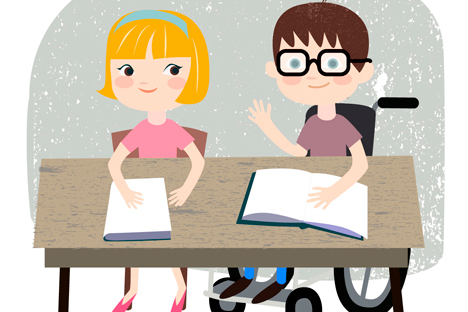
Drawing by Alena Repkina. Click to enlarge
When I came to Russia 26 years ago in 1989, people with disabilities were totally invisible. No buildings or forms of transport were accessible, and the media ignored the issue. It was as if there were no people with disabilities in Russia.
The majority of children with disabilities were educated in segregated special schools, residential institutions or in homeschool programs, often not leaving their homes for months due to the accessibility challenges. Children with intellectual disabilities were still considered uneducable – a term that was shocking to me – and were receiving no education at all. Orphanages also did not provide any education for their residents with disabilities.
Some of the people I met during my work with Perspektiva, an N.G.O. that promotes improved quality of life for people with disabilities, stand out as examples of the challenges children with disabilities face getting an education in Russia.
Once a young man named Alexander who had cerebral palsy and had grown up in an orphanage came to us for a job, but he was illiterate. So instead of finding him a job, we found him a Russian teacher.
I remember Natasha, a young wheelchair user from the Komi Republic, who had studied in a homeschool program. She never got her degree because she was unable to take some of her courses as there was no teacher available to visit her home.
Then there was Kirill, also a wheelchair user, who studied at a mainstream school in the early grades. When he entered middle school, however, he was supposed to transfer to a homeschool program since all the classes for the upper grades were on the third or fourth floor of the building, and the school had no elevator.
Perspektiva was able to secure a chairlift for Kirill, so he could continue to attend the same school. We were also able to help a parent of a child with Down Syndrome win a court case to allow her daughter to study in a local kindergarten.
There have been many positive changes over the past 10 years to support inclusive education in Russian schools, in which children with disabilities study in ordinary schools. The biggest changes have taken place over the past three years. In May 2012, Russia ratified the U.N. Convention on the Rights of Persons with Disabilities and the situation for people with disabilities began to improve at a much quicker pace. Russian cities are slowly becoming more accessible thanks to federal and local funding, and a new law on education that went into force on Sept. 1, 2013, guarantees inclusive education for children with disabilities and special education needs.
Attitudes towards people with disabilities are changing as they become more visible, and Perspektiva is playing a role in that. In 2003, Perspektiva began promoting inclusive education, developing and supporting pilot programs and raising awareness about the benefits of such education in our campaign “Children should go to school together.” We were the first disability N.G.O. to do this, and our campaign was the first one to raise awareness about inclusive education and its benefits. Today, our campaign is widely recognized, and our disability awareness trainings and other inclusive programs are in high demand not only by schools, but by the Ministry of Education.
Ten years later, in 2013, Perspektiva launched a national competition for Russia’s “Best Inclusive School.” We received 100 applications that first year and more than 400 in 2015. This competition has been endorsed by the Ministry of Education and Science, and the ministry is now a key partner in this annual event.
I know many children with physical and intellectual disabilities who were very excited about going back to their inclusive school or starting school on Sept. 1. But unfortunately they are still a minority, as parents continue to face a number of challenges to get access to inclusive education – teachers lack skills, knowledge and information about inclusive pedagogy; after testing, children with intellectual disabilities are still being sent to segregated special education schools; there are insufficient supports at schools for children with vision and hearing impairments; accessible transportation is lacking; there is a lack of trained teacher assistants, and funding is not always available to support them. And these are just a few of the challenges.
However, we at Perspektiva, together with our coalition of 25 regional disability and parent organizations that promote inclusive education, are confident that this movement, which has been slowly developing, will only move forward and continue to grow with government and community support. We hope that awareness and services will only continue to improve, and more and more parents will be able to choose inclusive education for their children.
Denise Roza is the director of Perspektiva.
All rights reserved by Rossiyskaya Gazeta.
Subscribe
to our newsletter!
Get the week's best stories straight to your inbox